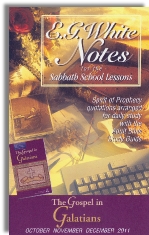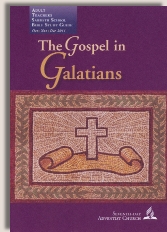|
||||||||||||||
Commentary on "The Priority of the Promise"
Day 6: Thursday, November 3, 2011 - The Superiority of the Promise
Overview
This next-to-the-last section of the weekly lesson is for all practical purposes the final installment for the week, with Friday's lesson providing only supplemental material. For this reason, the important meaning of the word "until", which, contrary to Adventist supposition, has a temporal meaning and marks the end of the Law, will receive due attention in today's lesson. I addition, today's lesson deals with a text that sounds difficult, even for the Adventist author, but, when rightly understood, offers the key for understanding the temporal nature of the Law.
Observations
Paul's reference to the law being given through a mediator appears obscure at first. Consequently, the Adventist author highlights the contrast between the direct promise God gave to Abraham and the mediated way the Law was given, through angels and through Moses. Logically, the fact that the law came indirectly from God emphasizes its secondary nature compared to God's direct promise. Still, the author doesn't understand that it's not the intermediary way the law was transmitted that constitutes Paul's focus.
Paul's main thought is that the covenant with Abraham was one-sided, with God alone standing behind His promise, while man was only the passive beneficiary of God's covenant blessings. The way in which God made the covenant with Abraham is illuminating: God alone passed through the animals used to cut a covenant while Abraham was sleeping (Gen. 15). Abraham didn't pass between the animals, only God. "Now an intermediary implies more than one, but God is one" (Galatians 3:20). Only God stood behind His covenant with Abraham, the covenant rested on God's doing His part alone. In contrast, the intermediary implies more than one; in the mediated Mosaic covenant both God and the people had to fulfill their promises. The people, who swore obedience to the law, had to keep it, had to fulfill their obligation, and only if they would fulfill their obligation would the covenant work.
The history of Israel is enough to prove that as long as a covenant rests, even partially, on man's promise, it can't work. Only the covenants based exclusively on God's activity, entirely on God's promise, are working and will work for sure, because God is not a liar, and He has also the ability and the capacity to fulfill His promise. The Mosaic covenant, based on both God's promise and man's promise, illustrated, through contrast, the same truth. The covenant with Abraham succeeded because it rested on God's promise alone; the Mosaic covenant didn't work because it was based on something more than God's promise. Both covenants still work together, albeit using different paths, to guide the sinner toward faith alone in God's promise fulfilled in Christ. In this way, the Law was not against the promise, but it was given to teach in a negative and very practical way the positive lesson taught in the Abrahamic covenant.
The other side of the coin is that the Law, as a covenant based on the promises of two parties, given with the intention to teach a negative lesson, could not ultimately have a positive fulfillment. Paradoxically, it had to be a failure in order to be successful. In order to teach the people the lesson of faith, it had to fail in delivering what it promised, because the inheritance was not by works (which were what the law was based on, "Do this and you should live") but on faith "Have faith and you will live" - "The righteous will live by faith" (Galatians 3:11,12).
Because of this reality, the law had to end at some point when the time was proper: God's promise fulfilled in Christ is the point when faith is confirmed as the true means of inheritance while the opposite way of inheritance, by works, must cease to be embedded in the Mosaic covenant. The believer must understand that ultimately God's promise fulfilled already in Christ is the guarantee of his salvation and works of the law must disappear from the picture in order to let Jesus Christ be seen in His full glory.
Copyright 2011 BibleStudiesForAdventists.com. All rights reserved. Revised November 2, 2011. This website is published by Life Assurance Ministries, Glendale, Arizona, USA, the publisher of Proclamation! Magazine. Contact email: BibleStudiesForAdventists@gmail.com.
The Sabbath School Bible Study Guide and the corresponding E.G. White Notes are published by Pacific Press Publishing Association, which is owned and operated by the Seventh-day Adventist church. The current quarter's editions are pictured above.
Official Adventist Resources
Standard Edition Study Guide Week 6
Teacher's Edition Study Guide Week 6
Easy Reading Edition Study Guide Wk 6
Search the Complete Published Ellen G. White Writings
Please Support This Project


